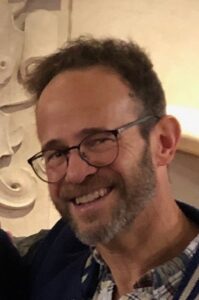Jack Bauer, University of Dayton – How Stories Foster Flourishing
 On University of Dayton Week: Everyone wants to make sense of their life and time on Earth.
On University of Dayton Week: Everyone wants to make sense of their life and time on Earth.
Jack Bauer, professor of psychology, delves into one way to try to do so.
Jack J. Bauer, PhD, is Professor of Psychology and past Raymond A. Roesch Endowed Chair in the Social Sciences at the University of Dayton. His book, The Transformative Self: Personal Growth, Narrative Identity, and the Good Life (Oxford University Press, 2021), explores how personal and cultural narratives foster (and thwart) human flourishing for the self and others. He is also co-editor of the book Transcending Self-Interest: Psychological Explorations of the Quiet Ego (American Psychological Association Books, 2008). He has served as co-editor of the Journal of Happiness Studies and associate editor of the Journal of Personality and Social Psychology. Before graduate school he was the editor of a newspaper in northern Michigan.
How Stories Foster Flourishing
How do we make sense of our lives? What makes a good life? How do we make it happen?
One way we make sense of life is through our life stories, which convey what we value and who we are—our narrative identity. Specific elements of narrative identity—like tone, theme, and structure—convey and predict particular qualities of a good life, such as happiness, meaning, love, wisdom, or growth. As it turns out, we can study all this scientifically, with reliable measures and statistics.
I study a prototype of narrative identity that I call the transformative self, which is a self-identity that features narrative themes of humanistically motivated growth for the self and others. These growth themes come in many forms, but they generally contrast with materialistic and egoistic themes, and they predict meaningfulness in one’s activities and relationships. When growth themes are coupled with a narrative structure that is relatively complex—where the story conveys multiple points of view rather than just one’s own—we find correspondingly high degrees of measured wisdom, perspective-taking, and concern for the welfare of people beyond one’s friends and family.
To construct our narrative identities, we borrow narrative tools of tone, theme, and structure from the stories around us, especially the master narratives of our families, communities, and cultures, which provide individuals with ideals for a good life story. For instance, a cultural master narrative for the transformative self is found in the bildungsroman genre of literature and film—the genre of personal growth. However, master narratives presuppose certain privileges and resources, so living out these master narratives is not easy, especially for those who face forms of social marginalization.
Through narrative analysis we can better understand the meanings and underlying motives of ourselves and our cultures allowing us to work together to foster human flourishing.
Read More:
The Transformative Self
Related Posts
-
 Sarah Raskin, Trinity College – Brain Injuries Aren’t Just Happening in Sports
It’s not just athletes who have to worry about brain injuries. Sarah Raskin, Charles
Sarah Raskin, Trinity College – Brain Injuries Aren’t Just Happening in Sports
It’s not just athletes who have to worry about brain injuries. Sarah Raskin, Charles -
 Zachary Silver, Occidental College – Understanding Canine Perception of Human Behaviors
On Occidental College Week: We see our dogs as good pets, but how do
Zachary Silver, Occidental College – Understanding Canine Perception of Human Behaviors
On Occidental College Week: We see our dogs as good pets, but how do
